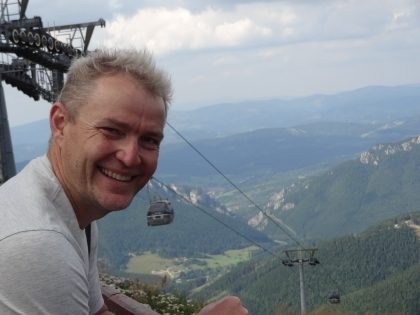
Peter Dolnik enters ‘Mouth of Hell’ to inspire Aboriginal Youth
Peter Dolnik of The George Institute for Global Health will battle icy waters and towering waves in the world’s toughest marathon swim next year to help inspire Aboriginal youth to live their dreams.
The ocean swim, known as the ‘Mouth of Hell’, runs between Northern Ireland and Scotland and has only been completed 24 times.
By completing the swim Mr Dolnik aims to inspire young people in Aboriginal communities to be determined to achieve their goals
“I’m an ordinary person and if I can swim the English Channel and aspire to swim across the North Channel, anyone can.”
“Kids in remote communities shouldn’t miss out on learning about water safety, or having a love for the water, because they don’t live in the city,” says Mr Dolnik
“I know that the communities want it but there is not enough funding at the moment.”
In a joint initiative between the National Aboriginal Sporting Chance Academy (NASCA) and The George Institute for Global Health, Mr. Dolnik hopes to raise $50,000 to assist children in remote communities in Central Australia access opportunities to swim.
The funding Mr Dolnik raises aims to increase access to safe, positive, swimming opportunities for Aboriginal children in the remote NT, through contributing to NASCA's existing work with Aboriginal young people in the region.
“When they come to the swimming pool they are so excited, I think it’s a positive thing to encourage it,” says Mr Dolnik.
Mick Gooda, Chair of NASCA and the Aboriginal and Torres Strait Islander Social Justice Commissioner, Olympic gold medallist Lara Davenport and Cyril Baldock, the oldest man to swim across the English Channel, yesterday launched the fundraising campaign with Mr Dolnik at an event at The George Institute for Global Health in Sydney.
Mr Gooda says events like this are important because they provide tangible support for programs sought by the community.
“Experience in Indigenous health has shown that programs that are built on strong relationships with Aboriginal and Torres Strait Islander people are the most effective.”
“It is really important for kids in rural communities to have access to sporting facilities. It means that there is a focus on health and goal setting.”
Since retiring from the swimming pool, Lara Davenport has worked with Aboriginal communities in rural Australia to encourage children to get into the pool, support a healthy life style and dream big.
“It is so important to inspire children to have goals, and show them that if you work hard you can achieve; you can make a difference in your life.”
Mr Baldock, who was 70 years 9 months old when he completed the English Channel swim, was born in a Japanese concentration camp during WW2 and started swimming to overcome chronic asthma, says you can overcome anything if you set your mind to it. “It’s important to believe in you and to work hard. Life is full of challenges but you can overcome them.
"When my body is crying and aching with pain I just tell myself, 'it’s just one day out of your life'"
To make a donation visit: https://give.everydayhero.com/au/NASCAnorthchannel
Rose Macdonald,
Business and Relationships Development Manager,
NASCA
Tel: +61 488 148 400
Maya Kay,
Communications Manager Australia,
The George Institute for Global Health
Tel: +61 424 195 878
National Aboriginal Sporting Chance Academy
NASCA is an Aboriginal governed not-for-profit located at the National Centre of Indigenous Excellence (NCIE) in Redfern.
Since its establishment in 1995 by notable Aboriginal NRL player David Liddiard, NASCA has worked with more than 12,000 young people, promoting school engagement and cultural pride through the 'hook' of sports.
Predominantly reaching young people in the Northern Territory and NSW, NASCA programs empower young people by providing engaging activities with a focus on careers, education, culture and healthy lifestyles.
NASCA Spends over 3,500 hours with around 1,000 young people every year. NASCA works with approximately 500 young people per year in the NT, running sports-based educational engagement and health programmes in collaboration with communities
Web: www.nasca.org.au


